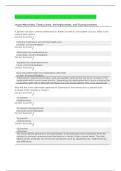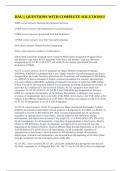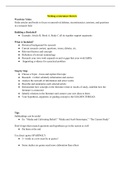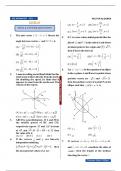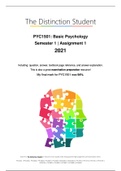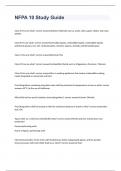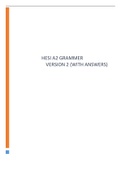18 January 2024 16:42
Introduction
Type of damages for the tort of negligence
All negligence elements still need to be satisfied in order to claim for psychiatric injury.
Leading Cases
McLoughlin v O'Brian [1982] 2 All ER 298
Facts: The husband of the claimant (C) and their children were involved in a road traffic accident at around 4 p.m. with a lorry driven by the first defendant and owned by
the second defendant. C, who was home at the time, was informed of the accident at around 6 p.m. C alleged that the impact ofwhat she heard and saw caused her severe
shock resulting in psychiatric illness and brought an action in negligence against the defendants.
Alcock and others v Chief Constable of the South Yorkshire Police [1991] 4 All ER 907
Facts: C and the other claimants all had relatives who were caught up in the Hillsborough Stadium disaster, in which 95 fans of Liverpool FC died in a crush due, it was later
established, to the negligence of the police in permitting too many supporters to crowd in one part of the stadium. The disaster was broadcast on live television, where
several claimants alleged they had witnessed friends and relatives die. Others were present in the stadium or had heard aboutthe events in other ways.
Page v Smith [1995] 2 All ER 736
Facts: C brought an action claiming damages for personal injury caused by the negligence of D, in that, as a result of the collision, his condition had since become both
chronic and permanent, making it unlikely that he would be able to pursue full-time employment in the future.
White and Others v Chief Constable of South Yorkshire Police & Others [1999] 1 All ER 1
Facts: The claimants (C) were all police officers who had been on duty within Hillsborough Stadium. C brought an action in negligence against their employer, the Chief
Constable of South Yorkshire Police (D), for the psychiatric harm they had suffered as a result of witnessing the tragedy first-hand.
Paul & Anor v Royal Wolverhampton NHS Trust [2024] UKSC 1
Facts: The claimants were relatives of individuals who died several months after a medical professional had misdiagnosed them. They suffered psychiatric injury as a result
of watching their relatives die. The claimants sued the defendant hospitals in negligence.
Paul & Anor v Royal Wolverhampton NHS Trust [2024] UKSC 1
The starting point for the majority -
[48] ‘The general rule that the law does not grant remedies for the effects - whether psychological, physical or financial - of the death or injury of another person’.
[C]ritical question raised by these appeals is whether or not the rules developed in relation to accidents apply where, as a result of negligence of a doctor, a
person dies or manifests injury from an illness which proper treatment would have prevented’ [24].
‘[W]hether this exceptional category of case includes - or can and should be extended to include - cases where the claimant’s injury is caused by witnessing
the death or injury of a close relative, not in an accident, but from a medical condition which the defendant has negligentlyfailed to diagnose and treat.’ [5]
An accident is -
[24] an unexpected and unintended event which causes injury (or a risk of injury) to a victim by violent external means.
Cannot draw analogy between cases of:
[115] illness caused by witnessing an accident (or its immediate aftermath) involving a victim with whom the claimant has a close tie of love and affection and
situations where the claimant does not witness an accident but suffers illness as a result of witnessing such a person suffering a medical crisis.
Definition of Psychiatric Harm
• Mental Distress alone not actionable in negligence: Lynch v Knight (1861) 9 HL Cas 577, 'Mental pain or anxiety the law cannot value, and does not pretend to redress,
when the unlawful act complained of causes that alone.'
Reilly v Merseyside AHA (1995) 6 Med LR 246 Johnston v NEI International Combustion Ltd [2007] UKHL 39
• Mental distress/psychiatric illness consequent upon physical injury actionable
• Anxiety, stress or grief suffered as a result of harm to a loved one not usually compensated - exception a fixed sum award under the Fatal Accidents Act 1976
Alcock and others v Chief Constable of the South Yorkshire Police [1991] 4 All ER 907
Lord Oliver: ‘grief, sorrow, deprivation and the necessity for caring for loved ones who have suffered injury or misfortune must, I think, be considered as ordinary and
inevitable incidents of life which, regardless of individual susceptibilities, must be sustained without compensation.’
First question, has the claimant sustained a recognised psychiatric illness?
→ Attia v British Gas [1988] QB 304: 'all relevant forms of mental illness, neurosis and personality change.’
Primary and secondary claimants
Second question, is the claimant is a primary or secondary victim?
- Need to be one or other
- Different rules apply
- Additional limitations if secondary victim
Psychiatric Harm Page 1
,- Additional limitations if secondary victim
- If not primary victim can only establish duty if fulfil additional requirements applicable to secondary victims
Psychiatric Harm Page 2
, L 31/01/24 Primary + Secondary
30 January 2024 17:33
Primary victims
Is the claimant a primary victim?
Page v Smith [1995] 2 All ER 736
Participant, who was directly involved in the event, and within the range of foreseeable physical injury (Lord Lloyd, [755])
- From the judgment of Lord Oliver in Alcock [1991] primary victims ‘those who are involved in an accident’; secondary victims those who are not involved but suffer from what
they see or hear [755]
Who benefits from categorisation as primary victim?
White and Others v CC of South Yorkshire Police & Others [1999] 1 All ER 1
Lord Hoffmann, if 'within range of foreseeable physical injury‘
Lord Steyn, primary victim if 'objectively exposed himself to danger or reasonably believed that he was doing so‘, applied in Cullin v London Fire and Civil Defence Authority, 31 March
1999,QBD
- Applied in Fagan v Goodman, 30 November 2001, If not in ‘zone of danger’ secondary victim
AB and Others v Leeds Teaching Hospital NHS Trust; Cardiff and Vale NHS Trust [2004] EWHC 644, [197]: The hospital was found to be negligent in removing and retaining Rosina's brain
without the parents' knowledge or consent. The practice of not warning parents of the possibility of organ removal during a post-mortem was not justified.
‘In my judgment, these claims do not fit easily into any of the descriptions given to primary and secondary victims. Tempting as it is to regard the primary/secondary victim dichotomy
as not relevant in these claims the House of Lords has made it clear that those claiming solely for psychiatric injury must be placed in one or other category in order to determine
whether or not the necessary control mechanisms come into play.’
Question whether primary or secondary victim a question of fact:
• On facts, primary victims because
• foreseeability test can be applied before the event
• children not primary victims
• closeness of relationship between doctor/parent
Wild v Southend University Hospital NHS Foundation Trust [2014] EWHC 4053
RE & LE & DE v Calderdale & Huddersfield NHS Foundation Trust [2017] EWHC 824: the High Court found that the defendant hospital trust’s negligence in the delivery of the infant
claimant had caused her hypoxic injury. It also held that the trust’s negligence had caused her mother (the second claimant) to develop post-traumatic stress disorder
→ YAH v Medway NHS Foundation Trust [2018] EWHC 2964: In law, unborn baby is part of mother, a single legal person until born (at which point gains independent legal
personality); Mother who suffers personal injury due to negligence which occurs before the baby is born is a primary victim
If primary victim, then ask in what circumstances will the def owe a duty of care?
Page v Smith [1995] 2 All ER 736, 758
'Can it be the law that the fortuitous absence of foreseeable physical injury means that a different test has to be applied? Is it to become necessary, in ordinary personal injury claims,
where the plaintiff is the primary victim, for the court to concern itself with different 'kinds' of injury?'.
'Since the defendant was admittedly under a duty of care not to cause the plaintiff foreseeable physical injury, it was unnecessary to ask whether he was under a separate duty of care
not to cause foreseeable psychiatric injury.'
- Was personal injury reasonably foreseeable
Lord Browne-Wilkinson, 753:
I am therefore of the opinion that any driver of a car should reasonably foresee that, if he drives carelessly, he will be liable to cause injury, either physical or psychiatric or both, to
other users of the highway who become involved in na accident. Therefore he owes to such persons a duty of care to avoid such injury.‘
Was it reasonably foreseeable by the def before the event that the def's negligence would expose cl to the risk of personal injury - physical or psychological?
AB and Others v Leeds Teaching Hospital NHS Trust; Cardiff and Vale NHS Trust [2004] EWHC 644
‘Was psychiatric harm a reasonably foreseeable consequence of the defendant’s act?’
Secondary Victims
If claimant is not a primary victim, they are classified as a secondary victim: in what circumstances does the defendant owe the claimant a duty of care?
Claimant must suffer psychiatric illness as a consequence of death, injury or endangerment of another (primary victim) not the defendant
Greatorex v Greatorex and another [2000] 4 All ER 769, QBD,
Limitations upon liability for psychiatric harm to secondary victims, HL
- McLoughlin v O'Brian [1982] 2 All ER 298
- Alcock v Chief Constable of the South Yorkshire Police [1991] 4 All ER 907
- Paul & Anor v Royal Wolverhampton NHS Trust [2024] UKSC 1: the judgment in this case stated that the supreme court judgement in Alcock was in full and the current law to be
followed in terms of secondary victims in psychiatric harm.
Alcock and others v Chief Constable of the South Yorkshire Police [1991] 4 All ER 907
Psychiatric Harm Page 3
, Alcock and others v Chief Constable of the South Yorkshire Police [1991] 4 All ER 907
• MASS DISASTER
1985 Bradford football stadium fire (40 dead); 1985 Manchester Airport fire (55 dead); 1987: Kings Cross Fire (31 dead);1987 Herald of Free Enterprise car ferry sinking (187 dead); 1988
Piper Alpha oil rig fire (167 dead); 1988 Clapham rail crash (35 dead); 1988 Lockerbie plane crash (270 dead); 1989 Hillsborough (100 dead); 1989 Marchioness pleasure boat sinking (51
dead).
• TELEVISED
Phil Scraton, ‘one of the most televised, monitored and photographed disasters in the UK’ (1992) Legal Action 7
• POST-CAPARO
HL in Alcock [1991]
To establish defendant owed duty of care to secondary victim who suffers psychiatric harm as a consequence of def’s careless act, establish
1. Was psychiatric harm reasonably foreseeable?
2. Was there a relationship of proximity between the claimant and the defendant?
Psychiatric Harm Page 4


